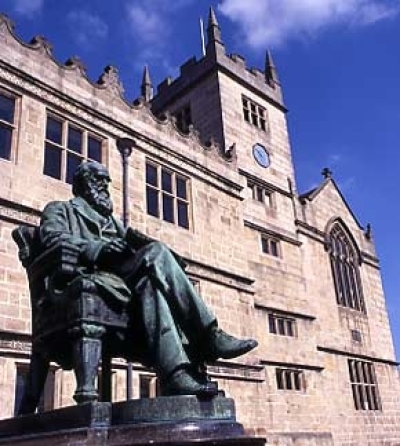Unlocking the Darwin Debate

You know Darwinism has problems, but how do you explain them to your friends and family? Well, look no further than a bicycle lock.
What's the greatest discovery in the history of biology? If you said "seedless watermelons," you're close. Actually, it's probably the discovery of DNA.
It's hard to imagine in this age of genetic engineering, but scientists in Darwin's time saw life as quite simple. Cells were thought to be blobs of primitive chemicals called "protoplasm." But as technology advanced and scientists were able to peer inside the cell, they discovered something amazing: Every living thing actually contains intricate, microscopic machines, performing functions without which life would not be possible.
The real breakthrough, came in 1953 when Watson and Crick uncovered the structure and function of DNA — the molecule that programs and regulates cells. It revolutionized our understanding of life. And it stretched Darwin's theory to the breaking point.
DNA is essentially a form of incredibly efficient digital code, uniquely suited for storing the blueprints of living things. And for something microscopic, it's huge. The human genome contains over a gigabyte of data!
Of course, like digital code on a hard drive, DNA can be corrupted. The most recent iteration of Darwin's theory claims that these corruptions — called mutations — are the engines of evolution.
But here's the problem: We don't have a single example of a mutation resulting in a net gain of information. Not one.

As intelligent design theorists have pointed out, unguided, natural processes always degrade information — they never increase it. If life at its most fundamental level is a digital code, then mutations are glitches that, if they accumulate, will eventually kill the organism.
Information is at the heart of life, and our uniform and repeated experience tells us that matter, by itself, never produces information. The only known source capable of producing information is a mind.
Okay, fine, you say, but how do I explain this over the dinner table?
One great place to start is a new video from the Discovery Institute that condenses the main argument for intelligent design to a snappy 20 minutes. It's called "The Information Enigma," and features noted ID authors Dr. Stephen Meyer and Dr. Douglas Axe.
Here are the basics: Using an analogy from Dr. Meyers' book, "Darwin's Doubt," the video compares DNA with a bicycle lock.
"The reason a bike lock works," explains Meyer, "is that there are vastly more ways of arranging those numeric characters that will keep the lock closed than there are that will open the lock."
Most bicycle locks have four dials with ten digits. So for a thief to steal the bike, he would have to guess correctly from among 10,000 possible combinations. No easy task.
But what about DNA? Well, in experiments Axe conducted at Cambridge, he found that for a DNA sequence generating a short protein just 150 amino acids in length, for every 1 workable arrangement of amino acids, there are 10 to the 77th possible unworkable amino acid arrangements. Using the bicycle lock analogy, that's a lock with 77 dials containing 10 digits.
Thus, as the film states, it is overwhelmingly unlikely that a random mutational search would produce even one new functional protein in the entire history of life on earth. In other words, random mutation is not driving the biological bicycle.
It's a powerful argument, and one I'd love you to understand and use. Come to BreakPoint.org, click on this commentary, and I'll link you to Discovery Institute's excellent new video. Then share it with your friends, and start some intelligent conversations about intelligent design.
This article was originally posted here




























